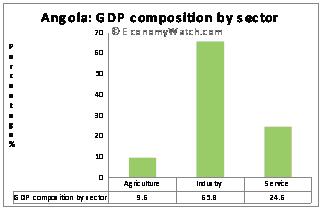Angola Economic Structure
Please note that we are not authorised to provide any investment advice. The content on this page is for information purposes only.
Table of Contents
Angola Economic Structure: Sector Wise GDP Share
Since the end of civil war in 2002, Angola economic structure has diversified into both mineral and non-mineral sectors. Sustained growth (above 10%) in the Angolan economy is attributed to the rise in international oil and commodity prices. The government is leveraging on the favorable international market by increasing production volumes from the new oil and diamond mines. However, lack of infrastructure and administrative efficiency is rampant across the nation.[br]
Angola Economic Structure: Sector Wise GDP Share
Mining sector is central to Angola economic structure. More than 50% percent of the country’s GDP comes from the export of petroleum and diamonds. However, in 2009, global recession and decrease in international oil prices affected the growth of Angola economy.
Agriculture still remains the primary employer for Angola. From the total labor force of 7.769 million (2009 estimates), agriculture employs approximately 85% of the population. Industry and service sectors together share the remaining 15%. Of late, agriculture productivity has also been picking up, with the use of modern tools and equipment. The fertile and mineral rich land of Angola is ideal for growing many cash crops.
Angola Economic Structure: Business Environment
Despite significant progress at the microeconomic level, the growth of the private sector is hampered by lack of entrepreneurship and administrative support. Business funds are available to a selected few with a previous history of successful business. However, the government is planning to bring major economic reforms to streamline the process of venturing into a new business for both foreign and private domestic players.[br]
Angola’s fiscal policy focuses on curbing inflation and reforming public finance systems. The government also plans to develop infrastructural facilities, particularly in the mining sector. The foreign and economic policy 2010-11 also focuses on reviving international trade relations and seeking foreign aid to build infrastructure.





